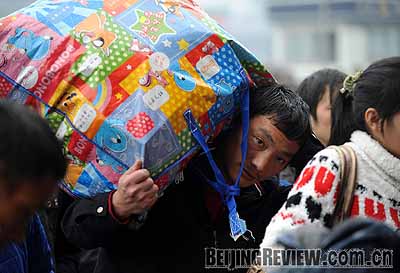|
|

|
|
ROAD HOME: Migrant workers at Guangzhou Railway Station on December 28. Vast numbers have returned home from China's developed coastal region in recent months amid rising unemployment (LIU DAWEI) | Beijing West Railway Station was as crowded as it always is at this time of year, with the Spring Festival just a week away. The waiting halls were stuffed with passengers, mostly migrant workers, chatting in all different kinds of dialects, while they sat on benches or their bags.
"I lost my job one month ago and I tried to find a new one but ended up with nothing. Since there's nothing for me to do here in Beijing, I'd better go home now. Anyway, the Spring Festival is coming," said a young man surnamed Li, from Hebei Province. He was eating a bowl of instant noodles for lunch in the corner of the waiting hall while he waited for his train, due in two hours.
Li used to work at a food factory in the suburbs of Beijing. The factory failed to survive the globe-sweeping economic crisis and its closure left dozens of migrant workers like Li jobless.
"Several of my co-workers packed up and went home instantly after the factory closed. I decided to try my luck, but there turned out to be no luck for me after a month of job hunting," Li said with a sigh as he finished the noodles.
Li is just one of the millions of migrant workers who have been affected by the massive economic slump. According to a local newspaper in Hebei, 400,000 of the 6 million migrant workers from the province have returned home. Such a large-scale rush by migrant laborers back to their hometowns has posed never-before-seen problems, according to the newspaper.
It is actually a common problem for many provinces and regions in China, a country that currently has 120 million migrant workers.
Since October 2008, there has been a huge movement of migrant workers back to their hometowns from the Pearl and the Yangtze River deltas, as a wave of businesses have closed. According to reports, the number of migrant workers by the end of October in China's developed coastal areas dropped by 6.5 percent over the same period in 2007.
Local governments have tried to protect the interests of migrant workers. Cities in south China's Guangdong Province, such as Dongguan, Foshan and Shenzhen, aim to provide training for migrant workers. The Dongguan City Government plans to ask all enterprises to pay into a government reserve fund to guarantee workers' wages if factories close.
In the central provinces of Henan, Hubei, Jiangxi and Anhui, local governments have held job fairs for returned migrant workers. Sixty enterprises provided more than 3,600 jobs for migrant workers at a single job fair held recently in Hanchuan City, Hubei Province.
Many hi-tech and large-scale enterprises in the Pearl River Delta are avoiding lay-offs and others are actually hiring. They are shortening workers' hours to lower costs and keeping skilled workers ready for an upswing in business.
At the macro-level, China's Ministry of Human Resources and Social Security Ministry is trying to include migrant workers in its unemployment registration network, making it mandatory for local authorities to register those who lose their jobs after having worked for more than six months in a city.
The introduction of services such as new job recommendations and unemployment insurance payments to the unemployed is also being studied, according to Minister of Human Resources and Social Security Yin Weimin.
The ministry is also considering providing unemployment-insurance subsidies to companies so that workers are not retrenched. It has asked large state-owned enterprises to shoulder their social responsibility and avoid laying off workers if possible. Meanwhile, local labor and social security authorities have been told to monitor struggling enterprises, and ensure that firms don't make people unemployed unnecessarily.
Local governments are also encouraging returned migrant workers to start their own businesses. Preferential policies regarding loans, taxes and business registration have been launched to help capable migrant workers carve out their own careers.
In Anhui Province, 700,000 migrant workers have returned home and started all kinds of enterprises.
Returning migrant workers have brought skills, information and all sorts of talents, which have pumped vigor into local economic development, said Zhu Yong, head of the Anhui Provincial Department of Human Resources and Social Security. | 